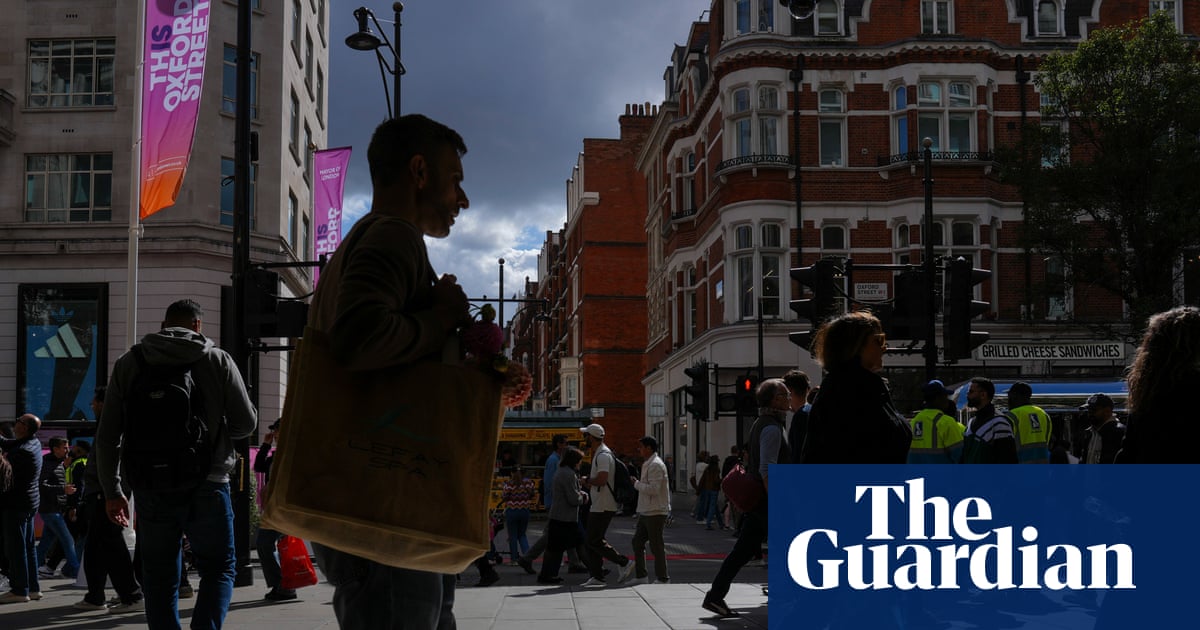
Inflation also hitting sales, says industry body, as Barclays says credit card spending fell in September
UK retail sales growth cooled last month as concerns over inflation and looming tax increases in Rachel Reeves’s autumn budget weighed on British consumers.
In a snapshot before the chancellor’s tax and spending event next month, the British Retail Consortium (BRC) said total sales rose more slowly in September than in recent months.
Separate figures from Barclays showed card spending fell 0.7% year-on-year in September. The bank said almost half of consumers in a survey of 2,000 individuals were making changes to their personal finances in anticipation of Reeves’s 26 November budget, with one in three building a savings buffer.
Helen Dickinson, the chief executive of the BRC, said the looming budget had affected spending alongside milder weather, while growth in the value of food sales was mostly down to rising grocery prices.
“Rising inflation and a potentially taxing budget are weighing on the minds of many households planning their Christmas spending,” she said.
The BRC said UK total retail sales increased by 2.3% year on year in September, compared with a growth rate of 3.1% the previous month. That was below the latest Office for National Statistics reading for inflation across the board, August’s 3.8% annual rate.
Food sales increased by a stronger 4.3% year on year, albeit as grocery inflation accelerates amid a fresh squeeze on living standards.
Non-food spending rose by 0.7% year on year, below a 12-month average of 0.9%, as milder temperatures across the UK deterred shoppers from refreshing their autumn and winter wardrobes. Sales were propped up by spending on electrical goods, after the launch of Apple’s latest iPhone and smartwatch.
Linda Ellett, the UK head of consumer, retail and leisure at the accountancy firm KPMG said non-food sales were growing by a meagre 1.2% on average. “Spending continues to be very targeted as consumers remain cautious,” she said.
Reeves is widely expected to raise taxes in her autumn budget. However, business leaders have warned higher costs for companies would be passed on to consumers in the form of price rises, hurting household finances and the economy at large.
In an intervention published late on Tuesday, the British Chambers of Commerce called on the chancellor to rule out business tax increases because companies had been left drained by higher levies she introduced in last year’s autumn budget.
Sign up to Business Today
Get set for the working day – we'll point you to all the business news and analysis you need every morning
after newsletter promotion
Shevaun Haviland, the director general of the BCC, said the November budget was a “make-or-break” moment for the UK economy. “Right now, many firms feel drained. They cannot plan ahead as they expect further tax demands to be laid at their feet.”
The 0.7% annual decline in consumer card spending recorded by Barclays in September, came after 0.5% year-on-year growth in August. Essential spending fell 2.6%, while growth in discretionary spending slowed to 0.2%.
Despite growing concerns over the chancellor’s budget, the bank said consumer confidence in households’ ability to live within their means had reached a four-year high of 78%, while confidence in personal finances remained resilient.
However, it warned households remained cautious amid the prospect of higher inflation, tax increases and broader economic uncertainty.
Karen Johnson, the head of retail at Barclays, said: “We’re continuing to see cautious spending, and shoppers are consistently seeking out areas they can cut back on. However, multiple retail categories have proved to be resilient in recent months, with furniture, clothing and beauty all remaining in growth since February of this year.”